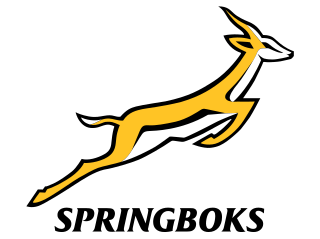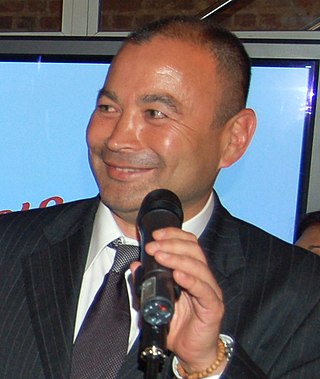This article needs additional citations for verification .(February 2024) |
This is a list of events in South African sport in 2005.
This article needs additional citations for verification .(February 2024) |
This is a list of events in South African sport in 2005.

The South Africa national rugby union team, commonly known as the Springboks, is the country's national team governed by the South African Rugby Union. The Springboks play in green and gold jerseys with white shorts, and their emblem is the Springbok, a native antelope and the national animal of South Africa. The team has represented South African Rugby Union in international rugby union since 30 July 1891, when they played their first test match against a British Isles touring team. Currently, the Springboks are the top-ranked rugby team in the world and reigning World Champions, having won the World Cup a record four times. South Africa have won half of the Rugby World Cups they have participated in and are also the second nation to win the World Cup consecutively.

The Australia national rugby union team, nicknamed the Wallabies, is the representative national team in the sport of rugby union for the nation of Australia. The team first played at Sydney in 1899, winning their first test match against the touring British Isles team.

The South Africa men's national soccer team represents South Africa in men's international soccer and it is run by the South African Football Association, the governing body for Soccer in South Africa. The team's nickname is Bafana Bafana, and South Africa's home ground is FNB Stadium, which is located in Johannesburg. The team's greatest result was winning the Africa Cup of Nations at home in 1996. The team is a member of both FIFA and Confederation of African Football (CAF). The team remains one of the best teams on the continent.
The Eswatini national football team, nicknamed Sihlangu Semnikati, represents Eswatini, formerly known as Swaziland, in international football and is controlled by the Eswatini Football Association. It has never qualified for the World Cup or the Africa Cup of Nations finals. Swaziland's best performance in an international tournament is a semi-final finish in the COSAFA Cup.

Edward Jones is an Australian rugby union coach and former player. He most recently coached the Australia national team from January until October 2023. He previously coached Australia, Japan and England. He returned to the role of Japan head coach in January 2024.
The Nelson Mandela Challenge Plate is a rugby union trophy contested between Australia and South Africa. It is named after South Africa's first democratically elected president, Nelson Mandela.
The 2005 Tri Nations Series, an annual rugby union competition between the national teams of Australia, New Zealand and South Africa, was the tenth in the series. The competition is organised by SANZAR, a consortium of the three countries' rugby federations. This was the last year in which the Tri Nations was contested in its original double round-robin format, with each team playing the others twice.
The 2006–07 A1 Grand Prix season was the second season for the A1 Grand Prix series. It began on 1 October 2006, at Circuit Park Zandvoort, and the season ended at Brands Hatch on 29 April 2007. A1 Team Germany won it with 128 points, 35 points lead ahead Team New Zealand.
In South Africa, many events and sports took place, like Rugby and Football, in 1994.
This is a list of events in South African sport in 1996.
This is a list of events in South African Sport in 1977.
This is a list of events in South African sport in 1999.
This is a list of events in South African sport in 2005.
This is a list of events in South African sport in 2006.

The South Africa women's national football team, nicknamed Banyana Banyana, is the national team of South Africa and is controlled by the South African Football Association.

Sport has a significant role in South African culture. The three most popular mainstream sports in the country — cricket, football and rugby — reflect the country's early British colonial influence. South Africa was absent from international sport for much of the apartheid era due to sanctions, but started competing globally after the end of apartheid. South Africa is among a very few countries which have participated in world cups of all three major sports — cricket, soccer, and rugby union. England, Ireland, Scotland, Canada, New Zealand, and Australia are among other such nations. South Africa has hosted the 1995 Rugby World Cup, 2003 ICC Cricket World Cup and 2007 ICC World Twenty20, and 2010 FIFA World Cup.

Association football, or soccer, as it is usually called in South Africa, is the nation's most popular sport and South Africa national soccer team is the nation's favourite sports team followed by rugby union and cricket. The governing body is the South African Football Association (SAFA), while the Premier Soccer League is the organisation responsible for running the country's two professional divisions, namely the South African Premier Division and the National First Division. The main cup competitions are the Nedbank Cup and the MTN 8 Cup.

The contest between The Wallabies and The Springboks is one of the major rivalries in rugby union. Since 2000s, the two teams have competed for the Mandela Challenge Plate.
The Angola women's national football team represents Angola in international women's football and it is controlled by the Angolan Football Federation. Their best place on the FIFA Rankings was the 82nd place, in December 2003. The only tournaments that they qualified were the 1995 and 2002 African Women's Championships, and their best finish was as Semi-Finalists in the 1995 tournament. Angola has, in contrast to many other African countries, has never suffered a heavy defeat. They have seldom lost by more than two goals.
The History of the South Africa national rugby union team dates back to 1891, when the British Lions first toured South Africa where they played against South African representative sides. The South Africa national rugby union team played few international matches during a period of international sanctions due to apartheid. Since the end of apartheid in 1994, South Africa has once again fully participated in international rugby.